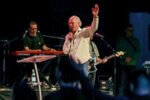A century after revival touched the world through the tiny nation of Wales, God is stirring faith for another visitation.
Spontaneous applause swept through the hall as Welsh pastor Sarah Trinder grabbed the microphone and screamed, “Something’s started happening–at last! We’ve been waiting long enough. Bless God! Praise Him!”
The audience responded with cheers and laughter–then jumped to their feet and started marching on the spot. It was a dramatic moment at “Celtic Wildfire: The Gathering,” a four-day conference held in a leisure center overlooking the vast coastline of Port Talbot, South Wales.
It was like an echo from the past, for this tiny nation–a principality of Great Britain, with its own language and culture–had already hosted a major revival. In 1904, in a tiny chapel in Loughor, an explosive awakening occurred that spread like wildfire to other communities. Men left their pints of ale in the pubs to check out the commotion in the chapels–and found them packed with people crying for Christ’s mercy.
Drunk on revival fervor, men and women took their untamed intensity of prayer from the church to the carpenter’s shop, the train station, the ferry boat–and more than 1,000 feet below the stunning Welsh landscape to the dark halls of the coal mines.
That was 100 years ago. But the rumbling has started again. The longing for a fresh awakening became almost tangible at the Port Talbot conference last fall. The seaside air was rich with expectation.
Trinder, 48, led the people in a song that went, “It’s the sound of r-e-v-i-v-a-l!” The former school principal directed them to look through a big picture window at the spectacular sea view outside. “That’s what we’re going to walk on! That’s what Jesus walked on–and that’s where we’re going.” The marching became faster and louder.
“I’ve got this feeling that something is going to be released,” she exclaimed. “Let’s shove over and do what the Holy Spirit tells us.” Chairs were quickly stacked up in piles to make way for falling bodies as Welsh Christians–thirsty for fresh rain from heaven–hit the floor after receiving prayer.
People can’t help but smile when Trinder speaks. She exudes a sense of joy that is explosive and contagious. She peppers her message with hilarious comments and funny stories–often cracking jokes at her own expense.
Trinder is part of a new wave of revivalists who offer fresh hope for Welsh communities. She leads a Pentecostal congregation called Tabernacle in the former mining town of Pontllanfraith. When she became pastor in 1999, fewer than 40 people attended the church. Now there are more than 100. “We believe that we’re going to be a church in the community–and God’s raising us up,” Trinder told Charisma.
Her vision is to develop a church that’s more like a leisure center–complete with gymnasium, Jacuzzi, healing rooms and a sanctuary for worship. She believes the church should be out in the marketplace as Jesus was. “We’re just at the very early stages,” she said. “We’re looking around for land.”
These new revivalists might not fit all the criteria of the typical conservative evangelical pastor–Trinder demolishes that image straightaway. But they are plugging into ancient powerlines that run right through the history and heritage of Wales like the seams of gold Roman invaders once mined here.
They take inspiration from yesterday in a bid to take new ground tomorrow. The Welsh Revival of 1904 made a deep impact on this land and sparked similar happenings as far away as Australia and Japan. But on the 100th anniversary of the historic revival, the fire needs to be ignited again.
“If we don’t prophesy, if we don’t release the word of God in our lives, then Wales will not be able to come into its destiny,” 22-year-old Gary Morgan warned the conference crowd. This fiery young preacher stirred hearts at the event with his whoever-dares-wins style of preaching, and with his call to “become abandoned” and “unlock revival” in the land.
Like Trinder’s, his bold proclamations triggered some noisy responses. As he hit the strings of a guitar that was lying on the stage behind him, Irish singer-songwriter Liz Fitzgibbon–part of the worship team–started shaking uncontrollably. “God is saying to our land, ‘You need to start to hear the key of heaven,'” Morgan told his audience. The atmosphere was electric.
It was a powerful message. Morgan later told Charisma that his hope is for Wales to be transformed so that once again it can “bless the nations.” He doesn’t get dewy-eyed with stories of past awakenings, but his face shows a fierce yearning for something heavenly to happen now. “What people need is a demonstration of God in the workplace,” he explained.
When he’s not leading prophetic schools at Church on the Move in Neath, Morgan works as a quality engineer for the Toyota car company. “I’m not frightened to give people words at work. You’ll get the wisecracks. But when you get
[co-workers] on their own and speak something of what the Lord is saying, they think, How do you know that?”
A Swell of Prayer
Carl Brettle takes a subtler approach. Very much the “father” of the event, this soft-spoken entrepreneur had organized three other conferences before–in addition to a prayer campaign that mobilized people around the world to intercede for Wales.
In 1999 he and a group of friends believed God was telling them to fill a million hours with prayer for Wales. They placed advertisements on the European-based God Channel, distributed prayer cards at an event in the Millennium Stadium at Cardiff, the Welsh capital, and sent out a promotion via e-mail.
“There was no definitive reason why, but why not?” Brettle said. “We need a breakthrough, we need the church to unify, and we need to see God move again in the land.”
They were shocked by a deluge of replies. “We found ourselves in the middle of total chaos as thousands of prayer cards came in.”
They received 26,000 e-mail responses in two months. When they reached their 1 million hours target, the correspondence still kept coming in. “We felt the Lord say ‘stop counting,’ so we did,” Brettle said.
There were all sorts of responses. An amusing message came from an inquirer in Iceland: “We’re praying for the whales–what’s wrong with them?”
Brettle, whose background is in computer consulting, admitted that this campaign isn’t the only catalyst for intercession in Wales. “There are other things going on as well, and generally there was a sense of prayer mobilization across the nation,” he pointed out. “Now we’re becoming a product of the prayer we prayed.”
He believes that on the 100th anniversary of the 1904 revival, something fresh is happening among God’s people. “The learning experience for me has been seeing people within this nation who never had the confidence to take responsibility slowly come around to the fact that it’s down to us. That’s been precious, and that’s developing.”
Like his peers, Brettle is stirred by accounts of the last awakening–particularly records of the prayers of Evan Roberts, the key leader of that revival. Roberts reportedly asked God to save 100,000 souls and to close the gates of hell over Wales for one year. The fiery young preacher got what he asked for.
“They are awesome, outrageous prayers,” Brettle explained. “If you look at what happened, the main thrust was for a year. One hundred thousand souls were saved, and it was the greatest revival Wales has ever known.” Brettle is planning no fewer than six “heritage tours” for 2004 so that visitors can get a taste of the revival during the celebration year.
However great the stories are–rough miners leading their manager to Christ, a school principal noting a new honesty among his pupils–for most Welsh people, the church is irrelevant in the 21st century.
In 1851, about 57 percent of the population attended church–today it’s more like 7 percent. Yet the nation has continued to influence the world. Actors such as Anthony Hopkins and the late Richard Burton , rock bands such as The Alarm and The Manic Street Preachers–plus, of course, star singer Tom Jones–have all hailed from this cultural hot-spot.
“Wales has always been influential in the nations. It’s that passionate drive,” Brettle said. Celtic wildness expresses itself not only in art but also in sport–particularly rugby. “When someone from Wales captures the heart of what they believe in, they’re virtually unstoppable. They give it their everything.”
Brettle is part of a team that’s using the Welsh passion for sport to plant seeds for the gospel. Sporting Marvels is a unique outreach program that aims to place Christian athletes as community development officers in local schools around the socially depressed Rhondda Valley–an area that played a key part in the 1904 revival. The first worker was recently appointed through the program.
The challenge for pioneers such as Brettle is to get Welsh Christians to believe in themselves again–after so many years of church decline. “One of the things Evan Roberts suffered from is that people would complain, ‘Why is it that the Holy Spirit only shows up after midnight in his meetings?’ But he believed so much in what he was doing that he was prepared to stay there all night. Show me a church that’s prepared to do that these days.”
New Trends
There are encouraging signs that something new is happening. “Three years ago and before that, people would say all they heard of was churches closing,” Brettle said. “Within the last couple of years, we’ve heard a lot about new churches opening.”
That fact is confirmed by an article published by the Evangelical Alliance in Wales. Titled “Getting a Handle on Church Life in Wales,” the feature acknowledges general church decline during the last 150 years. But it also shows that some denominations and networks have broken that pattern.
“Though the church has declined overall, this is not true of all churches,” states the report, written by National Assembly Liaison Officer Daniel Boucher. He was responding to an article in Wales’ national newspaper, The Western Mail, that suggested the church may soon be no more.
“One of the most striking features of the last 80 years has been the advent and rapid growth of a significant number of Pentecostal churches–Elim and Assemblies of God–and ‘New Churches’–Pioneer, Covenant Ministries International and, within this tradition, a significant number of vibrant independent congregations,” Boucher wrote.
“The new denominations differ from their traditional forefathers in many ways. Firstly they don’t normally meet in historic buildings with spires but in old converted factories, warehouses or purpose-built facilities. They have a far more modern style of worship and (especially in the new churches) a younger age profile.
“Perhaps it is because of their more contemporary approach that these new churches have proved remarkably successful at bucking the overall trend of decline.” Boucher quotes Pentecostal church leaders who actually reported significant growth in their congregations. In addition, Christianity still plays a major part in Welsh national life–despite the reports of falling attendance.
So what of Evan Roberts’ home church, Moriah Chapel, Loughor, where the revival first started? Charisma visited the birthplace of the awakening and found a small but active Sunday congregation of about 15–but a growing Monday prayer meeting that can be twice that. What they might lack in numbers, they make up for in faith.
Elder Dyfrig Griffiths becomes deeply emotional as he recounts the stories of the Welsh Revival. He loves to talk of the exploits of Evan Roberts, the icon of the awakening who set the young people on fire for God in the old chapel. Yet unbelievers were drawn more by an “irresistible force” than by any human agent. And Griffiths, 57, believes God can do it again.
“God is going to do a mighty work,” he said, in his rich Welsh tones. “We just have to wait. God is able. God is willing. And God is merciful.”
They believe God’s word to them is exactly that: “Wait.”
“We are awaiting a mighty outpouring of His Spirit,” Griffiths said.
Visitors come from all over the world just to step inside the building–poised at the start of the breathtakingly beautiful Gower Peninsula–where Roberts launched the greatest revival Wales has ever seen. They have included such well-known people as Dallas-based revivalist Steve Hill and evangelist and author Tommy Tenney.
More will come during the anniversary year. The hall has already been booked for events, and TV and radio companies from Great Britain and America are making their own special programs to commemorate the year.
A strange moment took place at Moriah recently when it seemed that Roberts had materialized once again amid the stately grandeur of its walls. No, it wasn’t an apparition. It was actually a look-alike playing his part for a new video A Diary of Revival. The program has since sold in the thousands and has had a powerful impact on those who have seen it.
Those who enter the chapel, with its modestly ornate ceiling and waxed wooden pews, find their imagination stirred. The atmosphere triggers images of swelling congregations enjoying hours of holy chaos as one person would weep, another would shout for joy and yet another would burst into song. Sometimes Roberts would just clap his hands, encouraging them to keep going.
What became known as the “great love song” of the revival–“Here Is Love Vast as the Ocean”–seems to remain as a distant echo within the plastered walls and paneled aisles. The original version was in the ancient indigenous Welsh language, and something of its poetic power has been lost in translation. But it still speaks to us today of the deep, stirring worship of the awakening.
Griffiths and his fellow elders–who are women, coincidentally, just as Roberts’ team mostly were–aren’t merely maintaining the fabric. They’re stoking the fire.
“People say lightning doesn’t strike twice,” Griffiths said, as he picked dead leaves off Roberts’ grave. “I say I know who created the lightning in the first place.”
WALES
Population: 2.9 million
Total area: 8,031 square miles, slightly smaller than New Jersey
Number of conversions recorded during the Welsh revival: At least 100,000
Percentage of population that attends church today: About 7 percent
Longest word in the Welsh language: Llanfairpwllgwyngyllgogerychwyrndrobwyll-llantysiliogogogoch
Clive Price is Charisma’s correspondent in the United Kingdom. He spent much of his childhood in North Wales, where some of his relatives now live.






Leave a Comment
You must be logged in to post a comment.